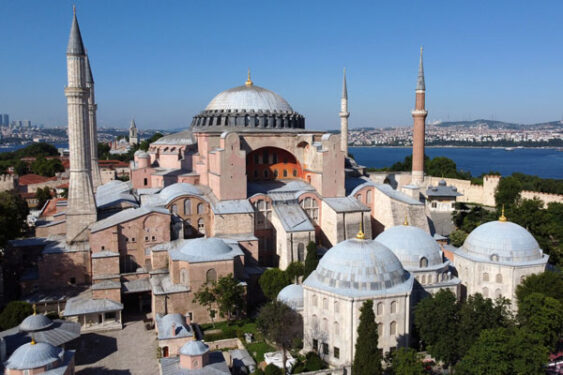
By Engy Magdy
CAIRO — For more than eight decades, the Hagia Sophia museum was a center for Christian-Islam heritage that attracted millions of tourists every year.
Now, that has changed as Turkish President Recep Erdogan has turned the religious and culturally-diverse museum that combines Byzantine and Islamic art, into a mosque.
Hagia Sophia (The Holy Wisdom) which is a UNESCO World Heritage Site, was built by Emperor Justinian I, in 532 to be a huge Christian Cathedral and episcopal see of the ecumenical patriarch of Constantinople.
It stood as the center of the Eastern Orthodox Church for more than 900 years before the Ottomans conquered Constantinople and converted it into a mosque in 1453. In 1934 it was converted into a museum by the first Turkish President and founder of the Secular Republic of Turkey, Mustafa Kemal Atatürk.
The recent decision to turn Hagia Sophia back into a mosque is not a surprise decision.
“Political Islam in Turkey always had a wish to change its statute to a mosque one day,” said a Turkish journalist who talked to The Tablet on condition of anonymity because of safety concerns. “Considering this political movement in this country … it is not a coincidence to make Hagia Sophia a mosque again now.”
In Egypt, Patriarch Theodore II of the Greek Orthodox Church of Alexandria expressed “great sadness and concern at the conversion of the biggest historical Christian landmark in the East.”
“This challenge stirs water already troubled during the coronavirus pandemic,” he said in a statement last Sunday.
The head of the Greek Orthodox Church said Turkey is using historical and cultural rights for its own purposes in a time, during the pandemic, when people should be coming together.
Christians in Egypt expressed anger on social media while Muslims expressed joy and support for the decision.
Hagia Sophia is considered a masterpiece that symbolizes the interaction between Asia and Europe over the centuries and reflects the universal nature of its heritage. As such, any modification of its current status, without any prior notification or dialogue, will be a serious issue for all people, not just an internal issue of the Turkish Government.
The leader of Greece’s Orthodox Church, Archbishop Ieronymos of Athens, condemned the decision and called it an insult not only to Orthodox Christianity — or even Christianity as a whole — but “the whole civilized humanity [and] any thinking human being, irrespective of religion.”
“This is a very important issue of religious violations and respect of religious rights,” Rev. Gabriel, Metropolitan of Nea Ionia and Philadelphia-Athens, told The Tablet.
Father Gabriel denied claims on social media that Greece may convert mosques on its land into churches: “We never consider that because this is not the way Christianity sees the world.”
“Christianity is a religion and a faith of revelation that respects other beliefs. We give our life to the love of God,” Father Gabriel added. “It’s not an opportunity to pay back, it’s an opportunity of prayer and of unity.”
Some Greeks, who spoke to The Tablet, said Hagia Sophia is an ecumenical monument of culture and a symbol of goodwill and peaceful coexistence of people with different religious beliefs.
Over the past few years, Greece has spent large amounts of money on reconstructing many mosques.
“It is generally appreciated in our culture the historical value of every monument situated in our country, despite its religious or ethnological origin,” one person said.
According to the Turkish journalist, the decision to convert Hagia Sophia is intended to appease people and gain support.
“The president’s popularity may rise again because of this, but it is logical this will be only temporary,” he added.
Erdogan said the first prayer in Hagia Sophia will take place on July 24. Under normal conditions, 3-4,000 people can pray at Hagia Sophia, but during the pandemic, there will only be 1,000 because of social distancing, according to Turkey’s head of the Directorate of Religious Affairs.

Long live the memory of the noble outlook of the first Turkish President and founder of the Secular Republic of Turkey, Mustafa Kemal Atatürk.